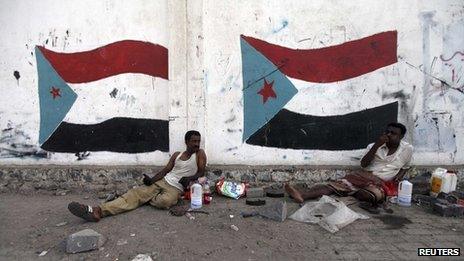Eight killed in attack on south Yemen army base
- Published

At least five soldiers and three gunmen have been killed in an attack on an army position in southern Yemen, military officials say.
Four soldiers are also missing after the raid on the barracks in Lahj province by assailants armed with automatic rifles and anti-tank weapons.
The officials blamed separatist Hiraak al-Janoubi (Southern Movement), but its leaders denied any involvement.
Tensions between southerners and the authorities have recently increased.
Funeral tent shelling
A week ago, two policemen and a civilian were killed as separatists attempted to storm the office of the governor of Daleh province, which is adjacent to Lahj, to raise the flag of the former South Yemen, which united with the North in 1990.
Then on Friday, an artillery shell landed near a funeral tent set up by Hiraak for mourners to pay their respects to the civilian who died.
Activists and medical sources said the shelling left at least 19 people dead, including six children.
Witnesses said the shell was fired by a tank and blamed the army. A local officer told the Reuters news agency that it was fired by mistake.
President Abdrabbuh Mansour Hadi has ordered an investigation.
A southerner, Mr Hadi rose through the ranks of the army of South Yemen and that of unified Yemen after 1990. He became defence minister and then vice-president in 1994, leading a military campaign that crushed a revolt in the south that same year.
Longtime President Ali Abdullah Saleh handed over power to Mr Hadi in November 2011 after a popular uprising that left hundreds dead.
He subsequently launched a national dialogue conference that discussed major issues, including complaints by southerners of political and economic marginalisation by the government in Sanaa.
In a separate development on Sunday, a court jailed nine members of al-Qaeda in the Arabian Peninsula (AQAP) for between two and 10 years for plotting to assassinate President Hadi.
Prosecutors said the group had planted a bomb on a road used by convoys to enter and exit the presidential palace, but that the device was found by security forces.
- Published27 December 2013
- Published19 October 2012
- Published13 February